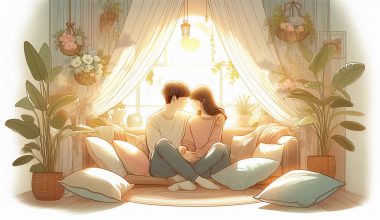When your girlfriend wets the bed, it can be surprising and concerning. Bedwetting in adults, also known as nocturnal enuresis, is more common than many people realize. It can happen for several reasons, including stress, hormonal imbalances, and medical conditions.
Addressing this issue with sensitivity and support is crucial. Your girlfriend may already feel embarrassed or upset, so your understanding and compassion are essential.
Being supportive helps her feel less alone and more comfortable discussing the problem, which is the first step towards finding a solution. Understanding the causes and providing emotional support can make a big difference in managing and overcoming bed wetting.
Understanding Adult Bedwetting
When your girlfriend wets the bed, understanding the underlying causes can help both of you address the issue effectively. Adult bedwetting, also known as nocturnal enuresis, can be caused by various factors.
Causes of Bedwetting
- Stress: High levels of stress and anxiety can lead to bedwetting in adults. Stress affects the body’s normal functions, including bladder control. Helping your girlfriend manage stress through relaxation techniques or counseling can reduce bedwetting incidents.
- Hormonal Imbalances: Hormonal changes, especially those affecting the antidiuretic hormone (ADH), can cause bedwetting. ADH helps the kidneys control urine production during sleep. If your girlfriend’s body produces less ADH at night, she might experience bedwetting.
- Medical Conditions: Various medical conditions can contribute to adult bedwetting. These include urinary tract infections (UTIs), diabetes, bladder issues, and sleep disorders like sleep apnea. It’s important to consult a doctor to rule out any medical reasons behind the bedwetting.
- Genetic Factors: Bedwetting can run in families. If your girlfriend’s parents or siblings experienced bedwetting, she might be more likely to experience it as well. Understanding this genetic link can help in finding the right approach to manage the situation.
Common Myths and Facts
There are many myths surrounding adult bedwetting, and debunking them can provide a clearer understanding of the issue.
- Myth: Only children wet the bed.
- Fact: Bedwetting can affect people of all ages. It’s not limited to children and can occur in adults due to various reasons.
- Myth: Bedwetting in adults is always psychological.
- Fact: While stress and anxiety can contribute to bedwetting, there are many other potential causes, including hormonal imbalances and medical conditions.
- Myth: Drinking too much water before bed is the sole cause.
- Fact: While reducing fluid intake before bed can help, it’s not the only cause of bedwetting. Other factors like stress and medical issues also play a role.
- Myth: Bedwetting is rare in adults.
- Fact: Bedwetting in adults is more common than many people think. Understanding this can help reduce the stigma and encourage seeking help.
By understanding the causes and debunking common myths, you can better support your girlfriend and work together to find solutions for adult bedwetting. This knowledge will also help in addressing the issue with sensitivity and understanding.
Girlfriend Wets The Bed: Immediate Steps to Take
When your girlfriend wets the bed, the initial reaction can set the tone for how you both manage the situation. Here are some immediate steps to take to ensure you handle it with care and support.
Stay Calm and Supportive
Maintaining a calm and supportive demeanor is crucial. Your girlfriend may already feel embarrassed or upset about the situation, and your reaction can either ease her discomfort or exacerbate it. Stay calm and reassure her that bedwetting is a manageable issue and that you’re there to support her.
For example, you could say, “It’s okay, this can happen to anyone. Let’s figure out how we can handle it together.” Your supportive attitude can make her feel more comfortable discussing the problem and working towards a solution.
Avoid Blame and Judgement
It’s essential to avoid making jokes or blaming your girlfriend for bedwetting. This can make her feel ashamed and less likely to open up about the issue. Instead, approach the situation with empathy and understanding.
Avoid statements like, “How could you let this happen?” or making light of the situation in a way that might hurt her feelings. Focus on the practical aspects and what you can do to help. For example, you might say, “Let’s look into some solutions together. I’m sure we can find a way to manage this.”
By staying calm and supportive and avoiding blame and judgement, you create a safe space for your girlfriend to address the bedwetting issue. This supportive approach is the first step towards finding practical solutions and helping her feel more at ease.
Practical Solutions
Addressing bedwetting involves practical steps that can help manage and reduce incidents. Here are some effective solutions to consider.
Protective Bedding
One of the first practical steps to take is to use protective bedding. Waterproof mattress protectors and absorbent pads can make a significant difference. These items help protect the mattress from moisture and make cleanup easier.
You can find waterproof mattress protectors in various sizes that fit snugly over the mattress, providing a barrier against moisture. Absorbent pads can be placed on top of the sheets and are easily removable and washable. These products help maintain hygiene and comfort, reducing stress about potential messes.
Adjust Nighttime Routines
Adjusting nighttime routines can also help manage bedwetting. Reducing fluid intake before bed is a common and effective strategy. Encourage your girlfriend to avoid drinking large amounts of liquids in the evening, particularly caffeine and alcohol, which can increase urine production.
Additionally, setting reminders to use the bathroom before bed can help empty the bladder and reduce the likelihood of accidents during the night. Establishing a regular bathroom routine can create a habit that supports bladder control.
Establish a Calming Bedtime Routine
Creating a calming bedtime routine can also be beneficial. Stress and anxiety can contribute to bedwetting, so incorporating relaxation techniques can help. Encourage activities such as guided meditation, deep breathing exercises, or listening to calming music before bed.
Reducing screen time at least an hour before bedtime can also improve sleep quality and reduce stress. A consistent and soothing bedtime routine helps promote relaxation and can positively impact sleep patterns, reducing the chances of bedwetting.
By implementing these practical solutions, you can help manage and reduce bedwetting incidents. Protective bedding, adjusted nighttime routines, and a calming bedtime routine are effective strategies to address this issue and support your girlfriend in feeling more comfortable and secure.
Encouraging Medical Consultation
When your girlfriend wets the bed, it’s important to know when to seek professional help. Consulting a doctor can help identify any underlying issues and provide appropriate treatment options.

When to Seek Professional Help
Consult a doctor if the bedwetting persists despite trying practical solutions. Persistent bedwetting could indicate an underlying medical condition that needs attention. Some signs that warrant a medical consultation include:
- Frequent Bedwetting: If bedwetting happens regularly over several weeks, it’s time to seek medical advice.
- Sudden Onset: If your girlfriend starts bedwetting suddenly without any apparent reason, it could be a sign of a new health issue.
- Other Symptoms: If bedwetting is accompanied by symptoms such as pain during urination, frequent urination, blood in the urine, or excessive thirst, it’s essential to consult a healthcare professional.
A doctor can conduct tests to rule out medical conditions like urinary tract infections, diabetes, or sleep disorders that might be causing the bedwetting. They can also provide treatments or suggest behavioral therapies to help manage the condition.
Supporting the Appointment
Offer to accompany your girlfriend to medical appointments for support. Attending the appointment together shows that you care and are willing to help her through this challenging time. It can also be reassuring for her to have someone there to listen and provide emotional support.
Before the appointment, you can help by writing down any questions or concerns she may have. This preparation ensures that all relevant information is discussed with the doctor, and no important details are overlooked.
During the appointment, be attentive and supportive, but allow her to speak and describe her experiences. Your role is to support and help her remember the doctor’s advice and instructions.
Emotional Support
Providing emotional support is crucial when dealing with a sensitive issue like bedwetting. Here are key ways to offer the support your girlfriend needs.
Listen and Validate Feelings
When your girlfriend wets the bed, it’s important to listen to her concerns without interruption. Give her the space to express her feelings and fears about the situation. This active listening shows that you care and are there for her. Avoid jumping in with solutions immediately; instead, focus on understanding her emotions.
Validating her feelings is equally important. Acknowledge her emotions by saying things like, “I understand that this is really upsetting for you,” or “It’s okay to feel embarrassed, but we will work through this together.” Validation helps her feel heard and understood, reducing feelings of isolation and shame.
Create a Judgement-Free Environment
Ensure that your home is a judgment-free zone where she feels safe and supported. Avoid making jokes or negative comments about the bedwetting. Ridicule and judgment can severely impact her self-esteem and make the problem worse.
Instead, foster a supportive and understanding environment. Encourage open communication and reassure her that bedwetting is a common issue that can be managed. Emphasize that you are a team and that she doesn’t have to face this alone.
Long-Term Strategies
Addressing bedwetting requires not only immediate solutions but also long-term strategies to effectively manage and potentially resolve the issue. Here are some long-term approaches to consider.
Track Patterns and Triggers
One effective strategy is to use a calendar to track bedwetting incidents. Note the dates and any potential triggers that could have contributed to the bedwetting. This might include:
- Dietary Changes: Record any significant changes in diet or fluid intake.
- Stress Levels: Note periods of high stress or anxiety.
- Sleep Patterns: Track variations in sleep schedules or quality of sleep.
- Medical Symptoms: Document any other symptoms that accompany bedwetting.
By tracking these details, you may identify patterns or triggers that contribute to bedwetting. This information can be invaluable when discussing the issue with a healthcare professional, helping to pinpoint specific causes and develop targeted strategies for managing the condition.
Consider Therapy
If stress or emotional issues are contributing factors, suggesting therapy or counseling can be very beneficial. A therapist can help address underlying emotional issues that may be causing or exacerbating bedwetting. Types of therapy that might be helpful include:
- Cognitive Behavioral Therapy (CBT): This type of therapy can help your girlfriend manage stress and anxiety, which may reduce bedwetting incidents.
- Behavioral Therapy: Techniques such as bladder training exercises can help increase bladder capacity and control.
- Support Groups: Joining a support group can provide a safe space to share experiences and gain advice from others dealing with similar issues.
Encourage your girlfriend to seek professional help if bedwetting is significantly impacting her emotional well-being. Therapy can provide her with tools to manage stress and develop healthier coping mechanisms.
Educating Yourself and Others
Understanding the nuances of adult bedwetting can help you better support your girlfriend and address any stigma associated with the issue. Here are some steps to educate yourself and others.
Research and Resources
Encouraging self-education about adult bedwetting is crucial. By learning more about the condition, you can provide better support and understanding. Here are some ways to educate yourself:
- Read Articles and Books: Look for reliable articles and books on adult bedwetting. These resources can offer insights into causes, treatments, and coping strategies.
- Medical Websites: Trusted medical websites often provide comprehensive information about health conditions, including bedwetting. Websites like WebMD, Mayo Clinic, and NHS can be valuable sources.
- Join Support Groups: Online forums and support groups can offer real-life experiences and tips from people who are also dealing with adult bedwetting. These communities provide a sense of solidarity and shared understanding.
Addressing Stigma
Addressing the stigma associated with adult bedwetting is essential for creating a supportive environment. Educate close friends or family members if they become aware of the situation:
- Share Information: Provide them with facts about adult bedwetting to dispel myths and misconceptions. Explain that it is a medical condition and not something to be ashamed of.
- Promote Empathy: Encourage friends and family to be empathetic and understanding. Highlight the importance of offering support rather than judgment.
- Create a Support Network: Fostering a supportive network can make a significant difference. Knowing that there are people who understand and care can reduce the emotional burden on your girlfriend.
Final Thoughts
When your girlfriend wets the bed, it is essential to approach the situation with understanding, support, and proactive solutions. By staying calm, avoiding blame, and offering practical and emotional support, you can help her manage this condition effectively. Utilizing protective bedding, adjusting nighttime routines, and encouraging relaxation techniques can make a significant difference.
Remember the importance of seeking professional help if the issue persists, and be supportive during medical consultations. Providing emotional support, such as listening and validating her feelings, and creating a judgment-free environment, is crucial. Long-term strategies like tracking patterns and considering therapy can also help address the underlying causes of bedwetting.
Educating yourself and others about adult bedwetting reduces stigma and fosters a supportive network. By understanding the condition better, you can provide more effective support.
We encourage readers to share their experiences and seek professional advice when needed. Your insights and stories can help others feel less alone and more empowered to address similar challenges. Together, we can create a compassionate and supportive community for those dealing with adult bedwetting.






